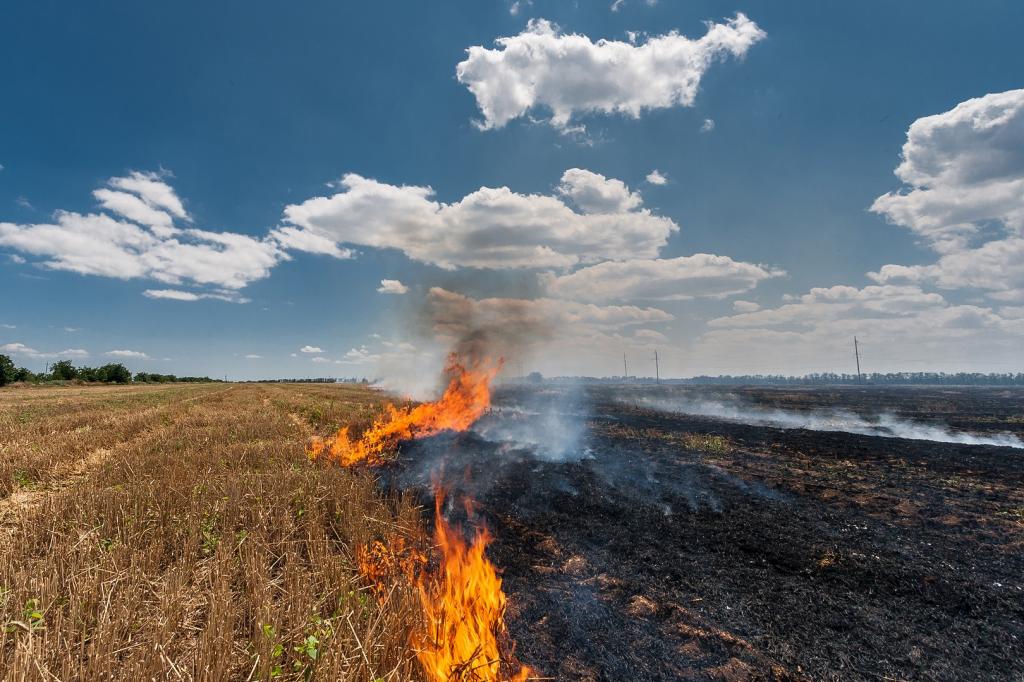Every year in October and November, farmers in states like Uttar Pradesh, Haryana, and Punjab burn the stubble that is left after harvesting the paddy crop to prepare the soil for sowing the next crop, which is generally wheat.
The burning of massive fields in these regions, along with the collapsing temperatures and reduced wind speed, contributes to air pollution in the Indo-Gangetic plains and especially in the landlocked national capital, Delhi.
For years, states have been unable to find sustainable solutions to the problem of stubble burning. Significantly, there had been a tremendous increase in stubble burning in the first six days of October in 2019 in comparison to the whole year.
What is Stubble Burning?

It refers to the intentional practice of setting fire to the remaining straw stubble of grains like wheat and rice that have been harvested.
The paddy residues take about one and a half months to decompose naturally and farmers generally don’t have this much time to sow their next crop, wheat. Thus, stubble burning is a cheap, quick, and efficient way to prepare soil beds.
Effects of Stubble Burning
- Affects air quality
- affects soil fertility
- Risk of fire spreading out of control
Scientists at IARI, Pusa last year came up with a remedy for the surging stubble burning crisis in North India. This remedy is so cheap that every farmer can easily buy it.
Scientists here have come up with ‘decomposer capsules’. These capsules also referred to as ‘Pusa Decomposer,’ are a composition of 8 micro-organisms in total, which will help in making the land ready for the sowing of the next crop without the farmers being entitled to burn the crop residue in huge amounts in approximately 20 days.
Dr. YV Singh, principal scientist, Microbiology department said that “The four capsules in a pouch can be used to make 25 liters of solution which can then be used on one hectare or 2.5 acres of field. This capsule will help in curbing the practice of crop burning. This can be used in all forms and on any farm.”
These green and red-colored capsules which have been priced at 20 rupees per packet containing 4 capsules each can go a long way in preventing Delhi-NCR from turning into a gas chamber.
Further, Dr. Ashok Kumar Singh, Director, IARI said, “We were working on this product for the past 5 years, we believe mass distribution is the key here. This product will fulfill two objectives – make soil fertile and fight the pollution menace.”
These capsules are a “microbial consortium” that is a combination of different microbes — which have “the ability to produce a variety of hydrolytic enzymes, which are responsible for the degradation of the polysaccharide; a key component of the plant cell wall.
How to use and prepare the mixture?
The process has been described by Dr. Singh as follows
- First, we have to take 150 grams of old jaggery(gud). Then it is to be boiled with water and all the dirt that came out during boiling should be removed.
- The solution is cooled down and then mixed with about 5 liters of water. And then about 50 grams of gram flour is added to it.
- Now we have to take the 4 capsules and mix them well in the solution. (A plastic or earthen pot with a large diameter is more preferable)
- The solution is placed in a pot in a warm place for at least 5 days(for fermentation). A biofilm will solidify on top of the water. We have to mix that layer well in the water.
- While we are adding water, make sure to wear gloves in hand and a mask on the mouth to prevent microbial exposure.
- Subsequently, after the initial four days, another five liters of water and 150 gm of jaggery are boiled.
- The solution is then cooled again and added to the first solution and left for two days.
- This step is repeated another three times after every two days, to increase the quantity of the solution to 25 liters.
- When mixing in water is done, our compost solution is ready for use.
From formulating the mixture to sprinkling it across 800 hectares of farmland, the entire procedure will roughly cost the government about Rs 20 lakh.
Also Checkout: Web 2.0 VS Web 3.0 – Major Differences You Need To Know